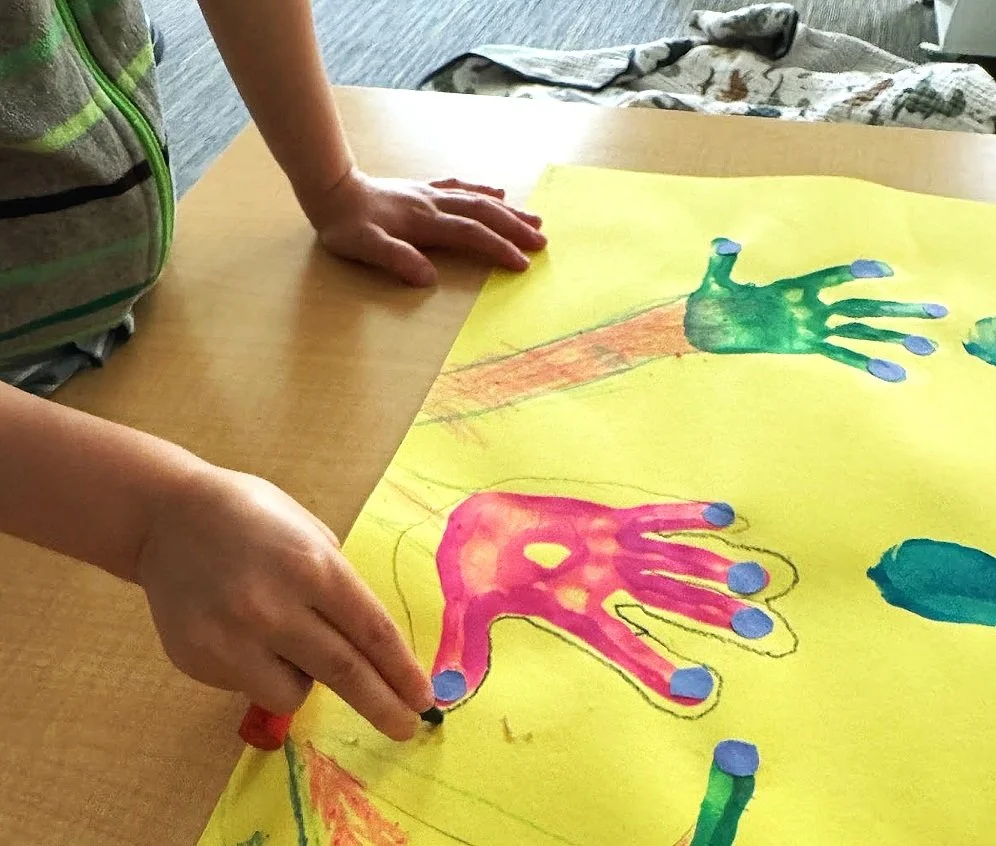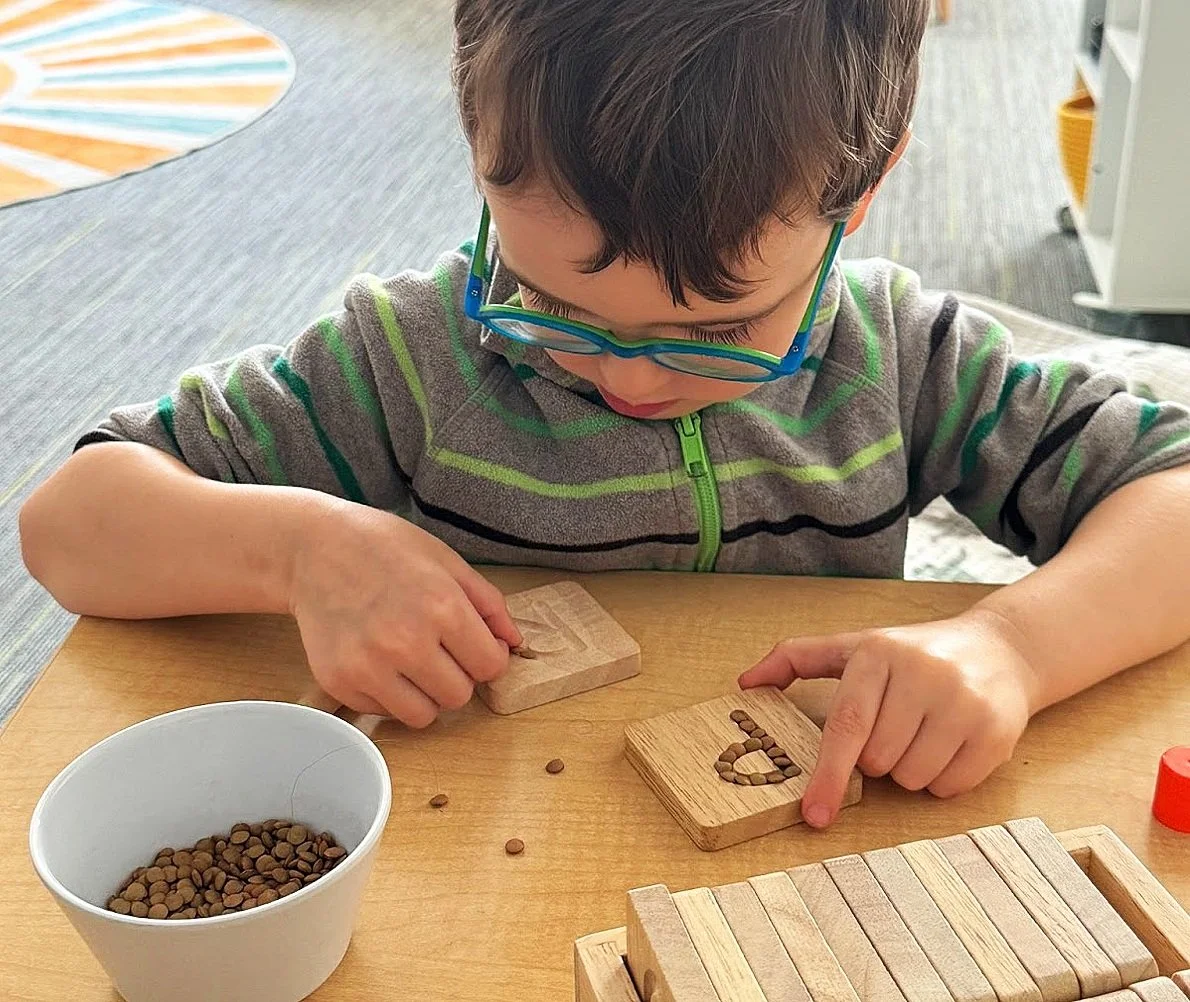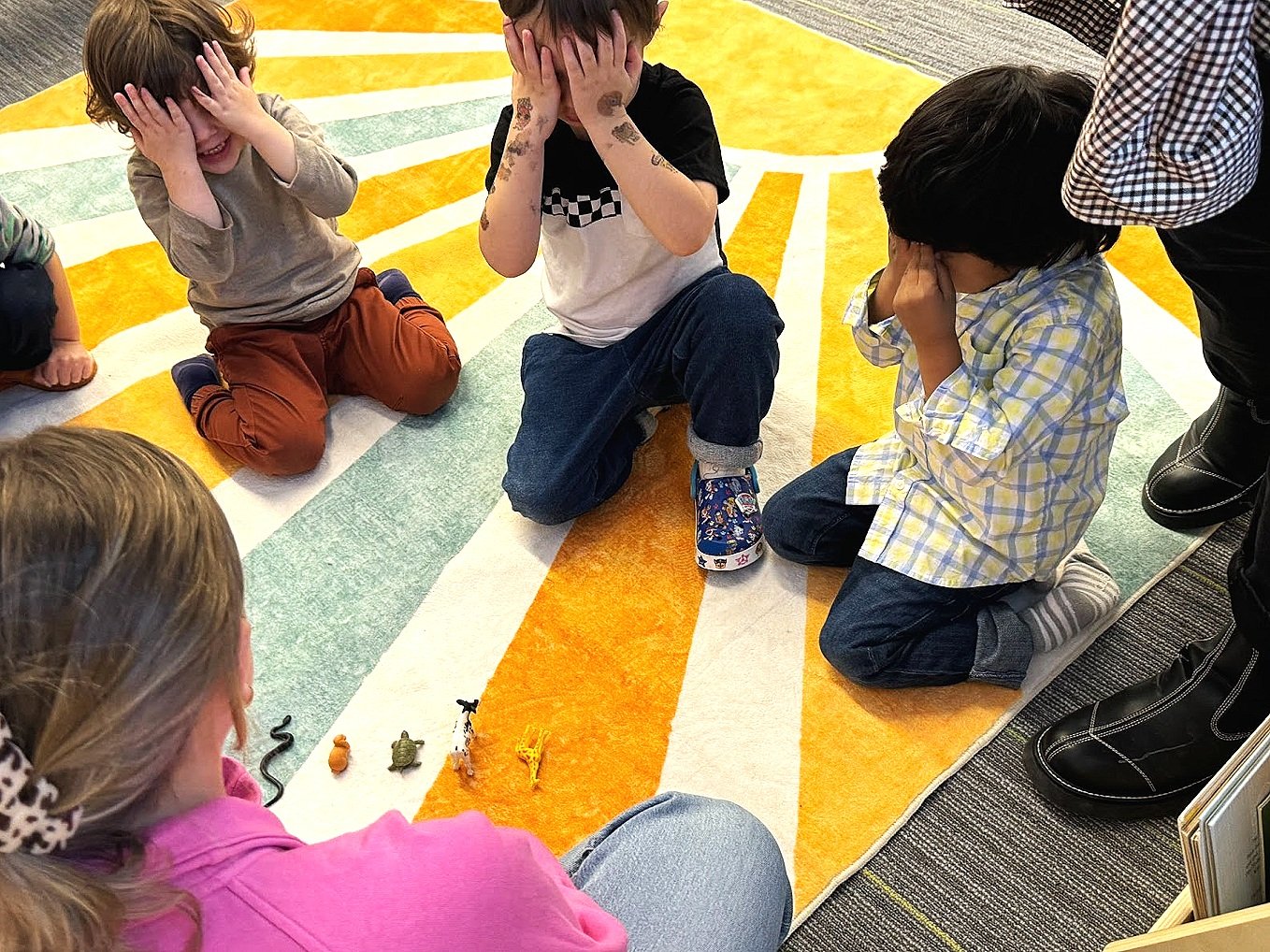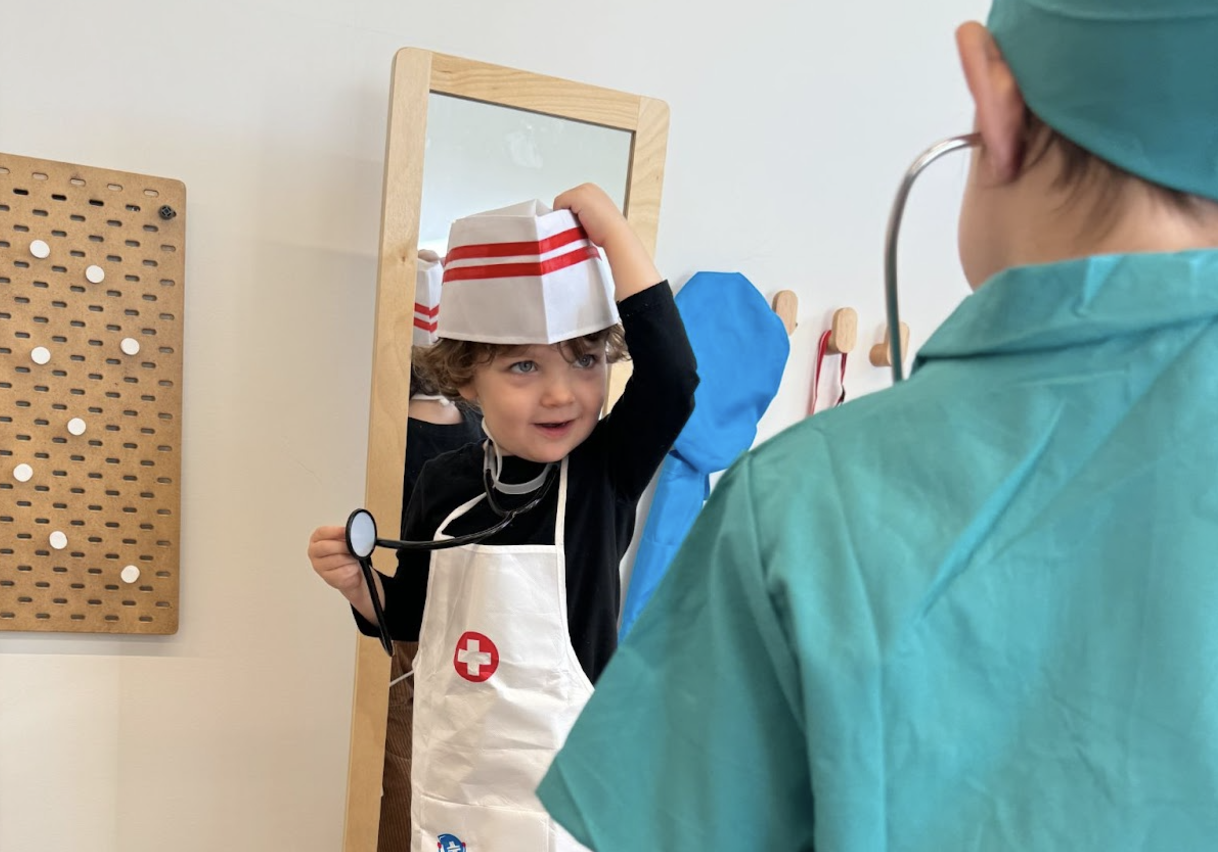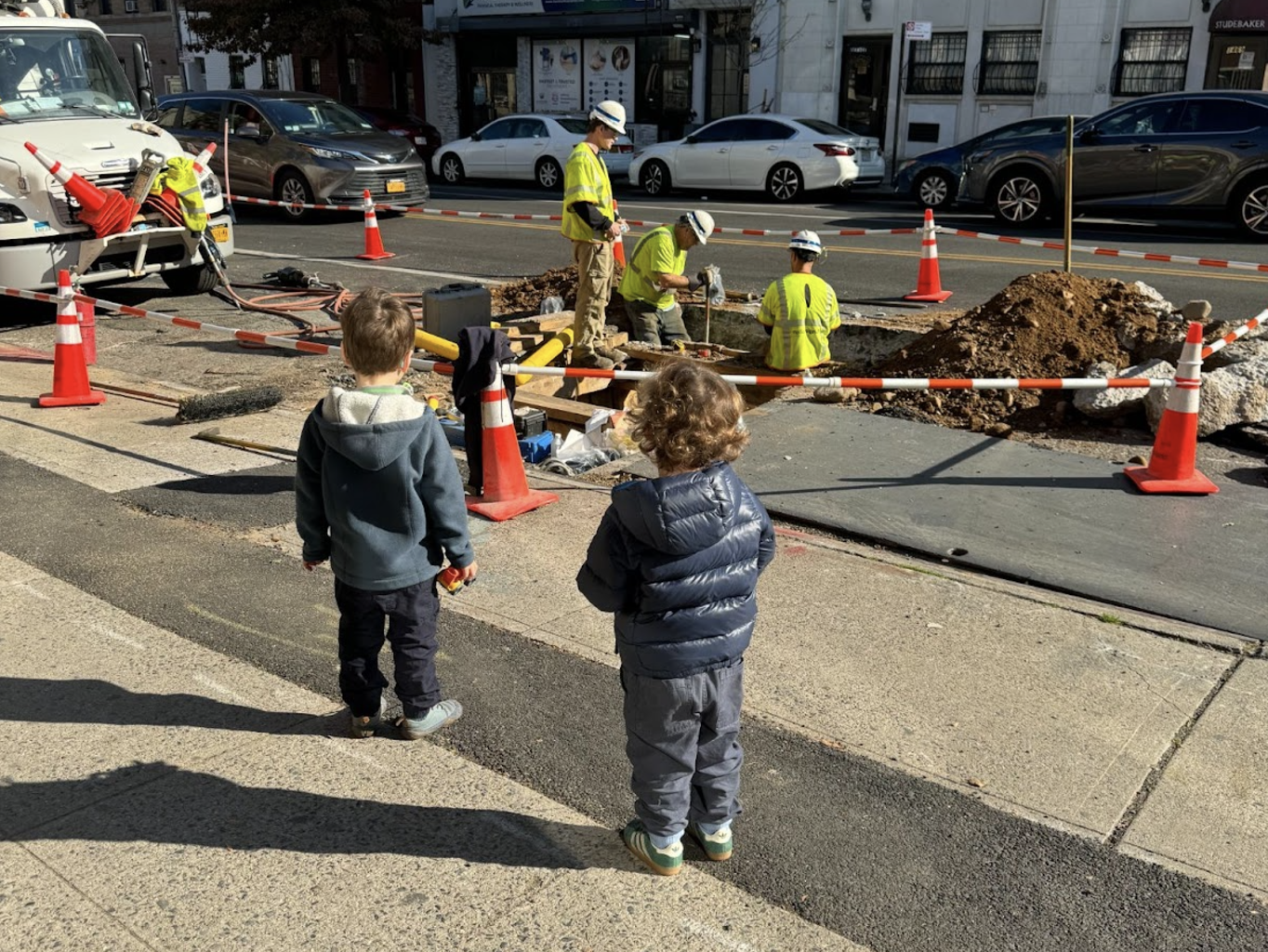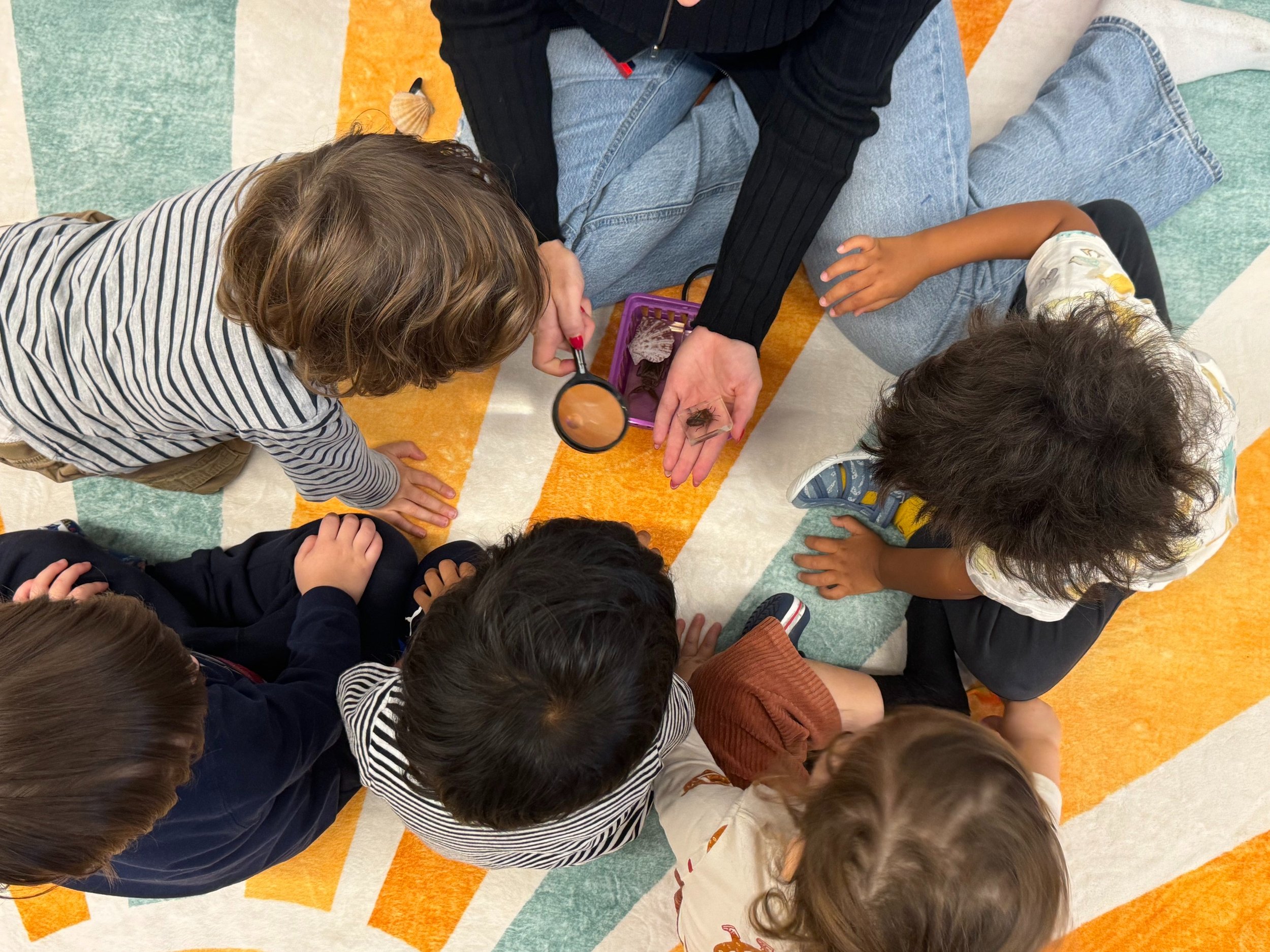
Preschool
Our child centered program for 3- and 4-year-olds focuses on the individuality of each of our students and creates a nurturing, welcoming environment where each child feels safe, valued, seen and recognized as an important contributor to our community.
Our teachers take an interdisciplinary approach that connects various subject areas, enabling deeper exploration and understanding. For instance, projects like seed growing blend science, math, art, music, and literacy, creating cohesive learning experiences that captivate and inspire young minds.
In our Montessori inspired classroom setting
we foster the development of:
A positive self-image, independence and life skills
Social emotional competences
Problem solving skills
Bilingual language acquisition
Cultural awareness
Age-appropriate early math skills and foundational skills for reading, writing, and language development
Creativity through engaging music and visual art lessons
Fine and gross motor skills through daily opportunities to be active
Language Arts
-
The preschool English curriculum is designed to foster early literacy and communication skills in an engaging and developmentally appropriate way. Students build a strong foundation through activities that promote phonological awareness, alphabet recognition, and letter sounds. Read-aloud sessions, vocabulary-building exercises, and meaningful discussions encourage a love of language and storytelling. Hands-on activities such as letter formation and interactive games ensure that learning remains dynamic and joyful. This curriculum not only supports early language development but also nurtures confidence and curiosity, setting the stage for a lifelong journey of learning.
-
The preschool German curriculum welcomes children of all language levels, from absolute beginners to native speakers. Language acquisition is fostered through daily conversations, interactive storytelling, and singing songs and rhymes. Students engage in hands-on activities like movement games, role play, and crafts to develop their German language and literacy skills. Visual and tactile resources, visits to the school library, and opportunities for alphabet recognition and early letter formation further enrich their learning experience. By creating a linguistically stimulating environment, we nurture a love of language and empower children to build confidence in their bilingual journey.
-
The preschool Spanish curriculum introduces children to the language in a playful and immersive environment. Through songs, rhymes, and storytelling, students begin to build vocabulary and develop listening and speaking skills. Hands-on activities, such as interactive games, role play, and crafts, make learning Spanish engaging and accessible for all learners. Teachers use a variety of tools, including visuals, movement-based activities, and music, to support comprehension and encourage participation. This approach fosters a positive connection to the language, laying the groundwork for future bilingual growth and cultural exploration.
Physical Education & Arts
-
The preschool physical education curriculum focuses on fostering physical development, coordination, and a love for movement through a variety of developmentally appropriate activities. Students participate in daily opportunities to strengthen their fine and gross motor skills, including running, jumping, throwing, and catching. Activities such as balance exercises, and movement games encourage agility and body awareness. Creative play, like animal movements and freeze dance, keeps students active while fostering imagination. These experiences not only promote physical well-being but also help build confidence, teamwork, and a fundamental appreciation for staying active and healthy. Our students use their classroom, our movement room, and our private outdoor playspace for their activities. They also make frequent trips to two nearby playgrounds.
-
The preschool music curriculum nurtures a love for music while supporting the development of listening, vocal, and coordination skills. Students explore rhythm and melody through singing simple songs, clapping, and using classroom instruments like drums and shakers. Activities such as movement and dance encourage creative expression and build gross motor skills. Through these interactive and joyful experiences, students develop an early appreciation for music, fostering creativity, self-expression, and a sense of rhythm that supports their overall development.
-
The preschool visual art curriculum encourages creativity, self-expression, and exploration through hands-on art activities. Students are introduced to a variety of materials and techniques, such as drawing, painting, collage, and sculpting, allowing them to experiment and bring their ideas to life. Art projects are often inspired by the students’ interests or tied to classroom themes, fostering a connection between creativity and their everyday learning. These activities not only nurture fine motor skills and artistic confidence but also provide an avenue for young learners to express their individuality and imagination.
Mathematics & Science
-
The preschool mathematics curriculum is designed to develop foundational skills through engaging, hands-on activities. Students explore early math concepts such as sorting and classifying, recognizing patterns, and understanding spatial relationships. Through playful interactions, they learn about counting, cardinality (the number of elements in a set), shapes, and measurement. Activities like building, matching, and using manipulatives make abstract concepts tangible and fun. These experiences not only enhance problem-solving and critical thinking skills but also spark curiosity and confidence in young learners as they begin their mathematical journey. Mathematical concepts are taught in both the target language and in English.
-
The preschool science curriculum inspires curiosity and a love of exploration through inquiry-based learning. Students are introduced to key concepts through units such as “What is a Scientist?”, “Our Five Senses,” “Animals,” “Weather,” and “Plants.” Activities like observing nature, experimenting with materials, and asking questions encourage critical thinking and discovery. Teachers also adapt the curriculum to align with student interests, ensuring a personalized and meaningful learning experience. This approach helps young learners develop an understanding of the world around them and builds a strong foundation for future scientific exploration.
Social-Emotional Learning
-
Everyday play is an essential part of our preschool curriculum, reflecting our belief in the transformative power of play for young learners. Through unstructured and guided play, children develop critical skills such as problem-solving, collaboration, and creativity. Whether building with blocks, engaging in imaginative role play, or exploring the outdoors, students learn to navigate social dynamics, express their ideas, and develop resilience. Play is not just a break from learning—it is a cornerstone of it, fostering cognitive, physical, and emotional growth while allowing children to discover the joy of exploration and self-expression.
-
Our classroom environment is thoughtfully curated and acts as a 3rd teacher. Inspired by the Montessori approach, our learning materials are visible, easily accessible, and stored on wooden shelves. The children are invited to independently choose what they would like to work on.
Our curriculum specifies four subject areas based on geometry, arithmetic, and quantities. Factual arithmetic plays a role in all of them.
Shape and change (developing spatial awareness, orientation in space and plane).
Numbers and operations (developing ideas about numbers and operations, ordering numbers, and operating with them).
Sizes and measurement (understanding the idea of measurement, developing ideas about quantities).
Data and chance (collecting, evaluating, and critically reflecting on data, developing a sense of probability).
General math skills we teach include problem-solving, communicating, reasoning, modeling, and representing. Students learn, among other concepts, how to:
Describe mathematical facts using technical language.
Recognize, justify, and describe mathematical relationships.
Extract and communicate relevant information from texts and visual representations.
Represent, comment on, reflect on, and evaluate solution processes.
-
Nearby field trips and community walks are integral to our preschool curriculum, connecting classroom learning to real-world experiences. These outings spark curiosity and provide hands-on opportunities for exploration, whether visiting a local park, touring the neighborhood, or engaging with community spaces. Highlights include visits to the local fire station, where students learn about fire safety and meet community helpers, and trips to nearby shops, where they explore everyday interactions and practice social skills. These experiences deepen students' understanding of their environment, foster a sense of belonging, and encourage observation, communication, and a love of discovery.
-
Community events are a vital part of our school experience, fostering connections between families, students, and the wider school community. Preschool families are warmly invited to participate in the life of the school through events such as cultural celebrations, seasonal festivities, and family gatherings. These occasions provide opportunities to build relationships, celebrate diversity, and strengthen the sense of belonging within our GSB community. By taking part in these shared experiences, families and students alike create lasting memories and deepen their connection to the vibrant life of the school.
Take a peek into our Preschool classrooms
Read what some families say about our program
My children joined the school in fall of 2021 with no prior German language knowledge. We do not speak German at home but wanted to give our children a bilingual education. We were drawn in by the unique hybrid curriculum, the warm community feel, and the chance for our children to have a well-balanced education. GSB did not disappoint. 3 years later my children are able to understand, speak and write German! They love going to school everyday because their voices are heard and opinions valued. They have made wonderful friendships and developed lasting connections with their teachers. They are get to work collaboratively on group projects as well as independently. We love this school and are so happy with our decision to attend.
Parent
Niche.com
The school’s dedicated and personalized approach to education has greatly benefited our children. The community welcomed us with open arms, even though none of us has a German background.
Parent
Google Search Review
The educators are more than just instructors; they are passionate mentors who genuinely care about each child's individual growth. Small class sizes ensure personalized attention and teachers typically stay with their students for two grades fostering strong bonds and a deep understanding of each child's strengths and weaknesses.
Parent
Niche.com





